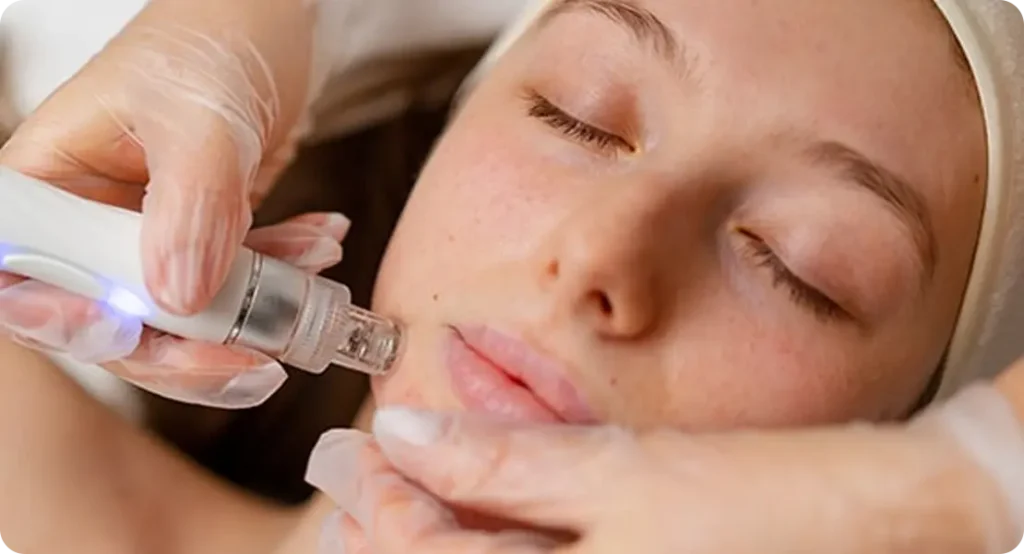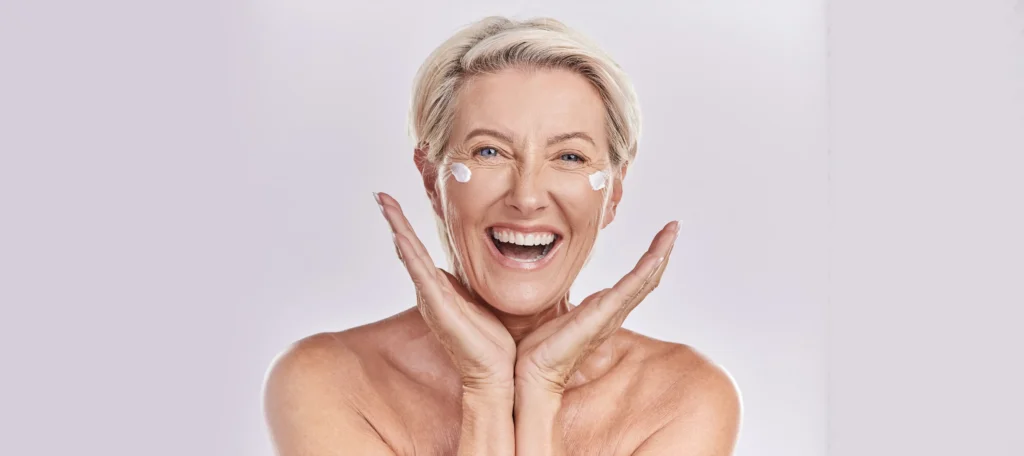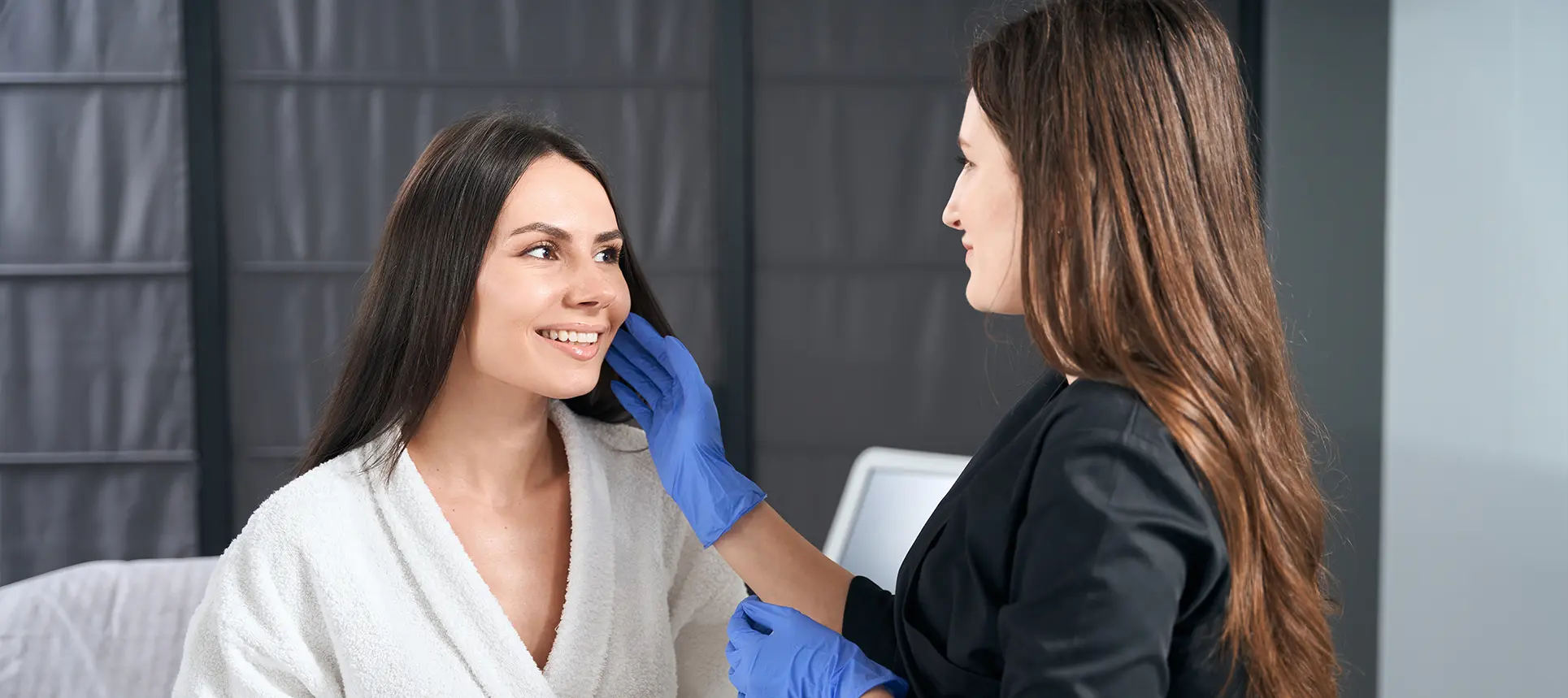When it comes to cosmetic dermatology, it’s completely normal to have loads of questions. Whether you’re thinking about trying a new treatment or just want to know what your options are, it’s important to get straight, jargon-free answers. So, in this guide, I’m tackling 19 of the most frequently asked questions patients have for cosmetic dermatologists – all in a down-to-earth way.
1. What training does a cosmetic dermatologist have?
A cosmetic dermatologist is a fully qualified medical doctor who has specialised in dermatology before undertaking additional training in aesthetic procedures. This means they start with a medical degree, followed by years of postgraduate training in general dermatology. After gaining experience and qualifications in diagnosing and treating medical skin conditions, they go on to specialise further in cosmetic treatments.
This additional training usually involves hands-on courses, supervised clinical experience, and in many cases, certifications in specific procedures such as injectables, lasers, and chemical resurfacing. Cosmetic dermatologists must also stay up to date with the latest advancements, attending industry conferences and ongoing professional development workshops.

The rigorous training ensures that cosmetic dermatologists understand not only how to perform aesthetic procedures safely but also how to assess skin health, manage complications, and achieve results that are both safe and natural-looking. Their medical background sets them apart from non-medical aesthetic practitioners.
2. How do I assess whether a cosmetic dermatologist is right for me?
Choosing the right cosmetic dermatologist is an important step that shouldn’t be rushed. Start by checking their credentials: are they registered with the GMC? Do they have specialist training in dermatology and cosmetic procedures? It’s also worth looking at their years of experience, especially in the specific treatment you’re considering.
Don’t hesitate to ask for before-and-after photos from previous patients, or even testimonials if available. A good cosmetic dermatologist will have a portfolio and will be happy to discuss realistic outcomes. Transparency during your consultation is key – you should feel comfortable asking questions and getting clear, honest answers.
Also, pay attention to how personalised their recommendations are. If you feel like you’re being pushed into a treatment without a full assessment, that’s a red flag. A professional cosmetic dermatologist will take time to understand your goals, evaluate your skin, and explain the pros and cons of each option.
3. What’s the difference between a cosmetic dermatologist and an aesthetician?
The main difference is medical training. A cosmetic dermatologist is a doctor with specialist knowledge in both medical and aesthetic skin treatments. They can diagnose skin conditions, prescribe medication, and perform medical-grade procedures. An aesthetician, while skilled in skincare treatments, does not have a medical qualification and cannot perform invasive procedures.
Aestheticians often provide services like facials, light chemical peels, and skincare advice. While these can complement cosmetic dermatology, they are not substitutes for professional medical care, especially if you have underlying skin concerns or want long-lasting results.
For more advanced treatments involving injectables, lasers, or deep skin resurfacing, it’s always best to go to a qualified cosmetic dermatologist. They have the expertise to handle complications and tailor treatments to your skin’s unique needs.
4. What conditions do cosmetic dermatologists treat?
Cosmetic dermatologists focus on improving the appearance of the skin, rather than treating medical conditions. That said, there is often some overlap, especially when cosmetic issues arise from underlying skin problems. For example, they might treat acne scarring, hyperpigmentation, melasma, or rosacea using aesthetic techniques.
Common concerns addressed by cosmetic dermatologists include fine lines, wrinkles, uneven skin tone, age spots, enlarged pores, sagging skin, and volume loss. They also help with hair thinning and non-surgical fat reduction in certain areas of the body, depending on their training and equipment.
While they do not replace general dermatologists for conditions like eczema or skin cancer, cosmetic dermatologists are excellent at helping you achieve smoother, brighter, and more youthful-looking skin. They combine medical knowledge with aesthetic skill to enhance your appearance safely.
5. Are cosmetic dermatology treatments safe?
When performed by a qualified cosmetic dermatologist, these treatments are generally very safe. Their medical background ensures they understand facial anatomy, skin biology, and how to prevent or manage complications. That said, every procedure carries some level of risk, no matter how minor it may seem.
One of the benefits of going to a medically trained professional is that they won’t just think about the aesthetic result. They’ll also assess your medical history, medications, allergies, and skin type before recommending anything. That level of care dramatically reduces the risk of problems.

To keep your treatment as safe as possible, always follow pre- and post-care instructions carefully, attend any follow-up appointments, and contact your dermatologist if you notice anything unusual after a procedure. Communication and trust are essential for your safety and satisfaction.
6. How often should I see a cosmetic dermatologist?
The frequency of visits really depends on your goals and the type of treatments you’re having. Some people book in every few months for maintenance treatments that help preserve skin quality and slow down signs of ageing. Others might only visit once or twice a year for targeted procedures.
If you’re undergoing a series of treatments – such as chemical peels, microneedling, or laser therapy – your dermatologist will create a timeline tailored to your skin’s needs. Between visits, they might also recommend a home skincare plan to enhance results and reduce the need for more frequent procedures.
Even if you’re not actively treating anything, an annual visit can be helpful. A check-in with your cosmetic dermatologist allows them to monitor your skin’s condition and catch early signs of ageing or sun damage. Prevention is often easier and more effective than correction.
7. Can cosmetic dermatologists prescribe skincare products?
Yes, and this is one of the major advantages of choosing a cosmetic dermatologist over a non-medical practitioner. They can recommend and prescribe clinical-grade skincare that’s proven to work. These products often deliver faster and more noticeable results than over-the-counter alternatives, though they do require professional guidance and monitoring.
Prescription skincare is especially helpful if you’re dealing with stubborn pigmentation, fine lines, or adult acne. With the right formula, you can often achieve smoother texture, more even tone, and a healthier complexion overall.
Many cosmetic dermatologists also develop their own skincare lines or work with trusted brands. So even if you don’t need a prescription, you’ll get access to medical-grade options that aren’t available in high street shops. This can be a game-changer for achieving healthy, radiant skin.
8. Can cosmetic dermatology help with scarring and texture issues?
Absolutely. Cosmetic dermatologists are well-equipped to address scarring and uneven skin texture, particularly those resulting from acne or injury. They use a variety of advanced treatments to stimulate collagen production and resurface the skin.
Common procedures include microneedling, laser resurfacing, and chemical peels, all of which work to smooth the skin’s surface over time. These are typically done in a series to achieve noticeable results, especially for deeper or more stubborn scarring.
Improving skin texture takes patience and consistency, but the results can be transformative. Your dermatologist will assess the type and severity of your scarring and tailor a plan suited to your skin’s needs.
9. What’s the recovery time like after cosmetic treatments?
Recovery times vary depending on the type of treatment you’ve had. Some procedures, like superficial peels or injectables, involve little to no downtime. You might experience mild redness or swelling, but this usually resolves within a day or two.
More intensive treatments like deeper peels or laser resurfacing may involve a longer recovery period, sometimes up to a week or more. You might experience peeling, sensitivity, or temporary discolouration as the skin heals and regenerates.
Your dermatologist will always provide aftercare advice, including what to avoid and how to support healing. Following this guidance carefully can help reduce discomfort and ensure the best possible outcome.
10. Are cosmetic dermatology treatments suitable for all skin tones?
Yes, though it’s essential that your cosmetic dermatologist is experienced in treating a wide range of skin tones. Some treatments, especially those involving lasers or strong chemical peels, can carry a higher risk of pigmentation changes in darker skin if not done properly.

That’s why it’s important to choose someone with the right knowledge and training. A skilled cosmetic dermatologist will assess your skin type and customise the treatment approach to minimise risk and maximise results.
Many modern devices and techniques are specifically designed to be safe and effective for all skin tones. Whether your concern is hyperpigmentation, scarring, or fine lines, there are suitable options available.
11. Can a cosmetic dermatologist help prevent signs of ageing?
Definitely. Preventative cosmetic dermatology is a growing area, with many people now seeking treatments in their late twenties or thirties to maintain skin health and delay the appearance of fine lines or sagging.
Treatments like light peels, skin tightening, and collagen-boosting procedures can help maintain elasticity and improve skin texture over time. In combination with targeted skincare, this approach can be very effective.
The benefit of working with a dermatologist is that they’ll create a personalised plan that evolves with your skin. They can help you stay ahead of age-related changes in a natural, subtle way.
12. What should I ask during my first cosmetic dermatology consultation?
Start by asking about the practitioner’s qualifications and experience, especially in relation to the specific concerns you have. It’s also helpful to know what treatments they offer, how they approach different skin types, and what kind of results you can realistically expect.
Ask to see before-and-after photos and be open about your concerns, expectations, and any previous treatments you’ve had. A good consultation should feel like a two-way conversation, not a sales pitch.
Also enquire about costs, recovery times, risks, and aftercare. The more informed you are, the more confident you’ll feel about your choices.
13. Can cosmetic dermatologists help with under-eye circles?
Yes, under-eye concerns are commonly addressed in cosmetic dermatology. The cause might be pigmentation, volume loss, or thin skin – and each requires a different treatment strategy.
Options may include light resurfacing treatments, targeted skincare, or volume restoration techniques, depending on what’s causing the issue. Your dermatologist will determine the best approach after examining your skin.
This is a delicate area, so it’s especially important to have it treated by someone with medical expertise and a deep understanding of facial anatomy.
14. Do cosmetic dermatologists perform non-surgical facelifts?
Many cosmetic dermatologists offer treatments that provide lift and definition without surgery. These include skin-tightening devices, collagen-stimulating injectables, and structural support procedures that restore facial contours.

Results can vary depending on age, skin quality, and the techniques used, but a skilled dermatologist can often achieve subtle yet noticeable lifting effects.
Non-surgical facelifts are ideal for those who want improvement without the downtime or risks of surgery, and they can be tailored to different areas of the face.
15. What’s the difference between cosmetic and plastic dermatology?
Cosmetic dermatology focuses on non-invasive or minimally invasive treatments to enhance the skin’s appearance. These might include peels, resurfacing, skin rejuvenation, or contouring procedures.
Plastic dermatology isn’t a formal term, but people often confuse cosmetic dermatology with plastic surgery. The latter involves surgical procedures such as facelifts or eyelid surgery, typically performed by plastic surgeons rather than dermatologists.
A cosmetic dermatologist will always stay within their area of expertise – and if your goals require surgery, they’ll usually refer you to a trusted surgeon.
16. Can I combine treatments for better results?
Yes, combining treatments is common and often yields the best outcomes. For example, resurfacing for texture and injectables for volume can work beautifully together.
Your dermatologist will assess your skin holistically and suggest combinations that complement each other. This approach allows for more natural-looking improvements across multiple areas.
It’s important that combination treatments are spaced out and done strategically. Your dermatologist will guide you through the safest and most effective schedule.
17. What’s the typical cost of seeing a cosmetic dermatologist?
Costs vary depending on the treatment, the clinic’s location, and the practitioner’s expertise. Initial consultations may range from £100 to £250, while treatments themselves can go from a couple of hundred to several thousand pounds.
It’s best to think of cosmetic dermatology as an investment in your skin. Quality care from a qualified dermatologist can save you time, money, and disappointment in the long run.
Avoid making decisions based solely on price. Safety, skill, and proven results should always be your top priorities.
18. How do I maintain results between visits?
Your dermatologist will likely recommend a tailored skincare routine to maintain results. This could include professional cleansers, targeted serums, and broad-spectrum sunscreen.
Lifestyle habits also matter – staying hydrated, eating well, avoiding smoking, and wearing daily sun protection can all prolong the effects of your treatments.
Routine follow-ups are helpful too. A quick check-in allows your dermatologist to tweak your regimen and ensure you’re staying on track.
19. Can cosmetic dermatology boost confidence?
Absolutely. For many people, improving their skin leads to greater self-esteem and comfort in social or professional situations. It’s not about vanity – it’s about feeling more like yourself.

Even small changes can make a big difference to how you carry yourself. When your skin reflects how you feel inside, it can lift your mood and mindset.
That said, cosmetic dermatology should never be a substitute for deeper emotional wellbeing. The best practitioners will support your confidence while helping you keep realistic, balanced expectations.
Final Thoughts
Cosmetic dermatology is about more than just looking good – it’s about feeling confident and comfortable in your skin. With the right practitioner, treatments can be safe, effective, and truly transformative, enhancing your natural features without changing who you are.
The key is to take your time, ask the right questions, and make sure you’re working with someone who prioritises your health as much as your appearance. A well-trained, ethical cosmetic dermatologist will always put your safety and wellbeing first.
Hopefully, this guide has cleared up some of your questions and given you the confidence to take that next step if you’re considering cosmetic dermatology. Just remember – your skin deserves expert care, and you deserve to feel good about it. If you’d like to speak with a professional, feel free to get in touch with us at the London Dermatology Centre to book a consultation with one of our expert cosmetic dermatologists.
